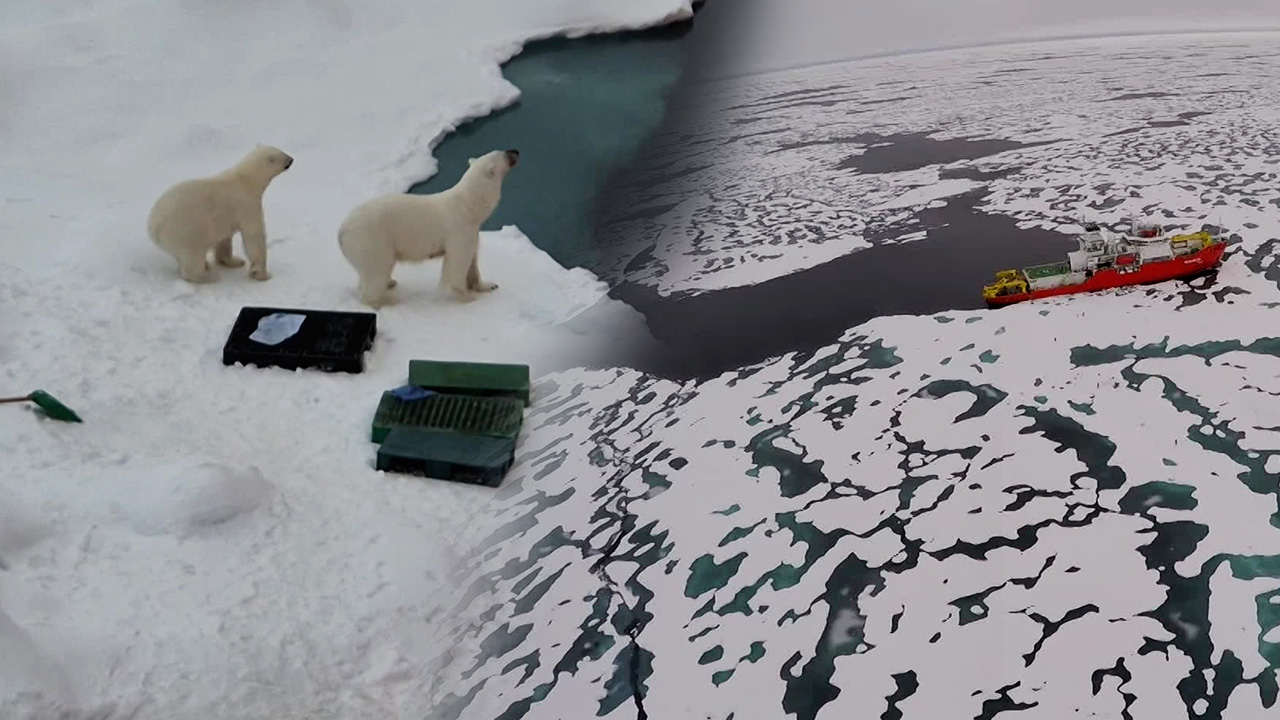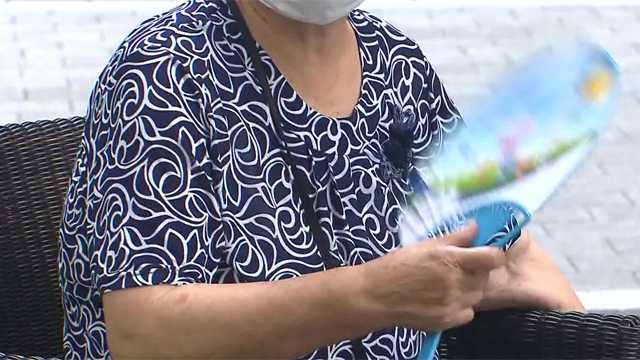Emergence of ‘climate engineering’ to re-freeze Arctic sea ice by 2070
입력 2024.10.28 (01:05)
읽어주기 기능은 크롬기반의
브라우저에서만 사용하실 수 있습니다.
[Anchor]
Global warming is rapidly reducing Arctic sea ice.
There are projections that all sea ice could melt in 20 years, and to prevent this, 'climate engineering,' which artificially adjusts the climate, is gaining attention.
Kim Se-hyun, a meteorology specialist, reports.
[Report]
Research Vessel Araon operated in the Arctic Ocean for two months last summer.
The researchers on board say that the reduction of Arctic sea ice is at a serious level.
[Yang Eun-jin/Head Researcher, Korea Polar Research Institute of Marine Research Placement: "There is almost no sea ice, so we were able to collect almost 100% of the equipment that we couldn't collect before. We couldn't find solid sea ice, so we had to go further north to barely conduct our research...."]
This is due to global warming, but efforts to reduce carbon emissions to prevent it are slow.
If warming continues at the current rate, projections suggest that all Arctic sea ice could melt in just 20 years.
As the climate crisis looms, 'climate engineering,' which artificially adjusts the climate like artificial rainfall, is gaining attention in academia.
Recently, international researchers analyzed that injecting fine particles that reflect sunlight into the stratosphere at 45 degrees north latitude could restore all Arctic sea ice by around 2070.
This is based on the principle that when a volcano erupts, volcanic ash blocks sunlight and lowers temperatures.
[Kim Hye-mi/Professor, Department of Science Education, Ewha Womans University: "In 1991, the Pinatubo volcano erupted in the Philippines, and the volcanic ash reached the stratosphere, beyond the troposphere, lowering the Earth's average temperature by 0.5 degrees (Celcisu)."]
Countries like the United States, which are advanced in climate research, are also actively increasing investments in 'climate engineering.'
However, there are significant concerns about the side effects of artificially controlling nature.
This is KBS News, Kim Se-hyun.
Global warming is rapidly reducing Arctic sea ice.
There are projections that all sea ice could melt in 20 years, and to prevent this, 'climate engineering,' which artificially adjusts the climate, is gaining attention.
Kim Se-hyun, a meteorology specialist, reports.
[Report]
Research Vessel Araon operated in the Arctic Ocean for two months last summer.
The researchers on board say that the reduction of Arctic sea ice is at a serious level.
[Yang Eun-jin/Head Researcher, Korea Polar Research Institute of Marine Research Placement: "There is almost no sea ice, so we were able to collect almost 100% of the equipment that we couldn't collect before. We couldn't find solid sea ice, so we had to go further north to barely conduct our research...."]
This is due to global warming, but efforts to reduce carbon emissions to prevent it are slow.
If warming continues at the current rate, projections suggest that all Arctic sea ice could melt in just 20 years.
As the climate crisis looms, 'climate engineering,' which artificially adjusts the climate like artificial rainfall, is gaining attention in academia.
Recently, international researchers analyzed that injecting fine particles that reflect sunlight into the stratosphere at 45 degrees north latitude could restore all Arctic sea ice by around 2070.
This is based on the principle that when a volcano erupts, volcanic ash blocks sunlight and lowers temperatures.
[Kim Hye-mi/Professor, Department of Science Education, Ewha Womans University: "In 1991, the Pinatubo volcano erupted in the Philippines, and the volcanic ash reached the stratosphere, beyond the troposphere, lowering the Earth's average temperature by 0.5 degrees (Celcisu)."]
Countries like the United States, which are advanced in climate research, are also actively increasing investments in 'climate engineering.'
However, there are significant concerns about the side effects of artificially controlling nature.
This is KBS News, Kim Se-hyun.
■ 제보하기
▷ 카카오톡 : 'KBS제보' 검색, 채널 추가
▷ 전화 : 02-781-1234, 4444
▷ 이메일 : kbs1234@kbs.co.kr
▷ 유튜브, 네이버, 카카오에서도 KBS뉴스를 구독해주세요!
- Emergence of ‘climate engineering’ to re-freeze Arctic sea ice by 2070
-
- 입력 2024-10-28 01:05:02

[Anchor]
Global warming is rapidly reducing Arctic sea ice.
There are projections that all sea ice could melt in 20 years, and to prevent this, 'climate engineering,' which artificially adjusts the climate, is gaining attention.
Kim Se-hyun, a meteorology specialist, reports.
[Report]
Research Vessel Araon operated in the Arctic Ocean for two months last summer.
The researchers on board say that the reduction of Arctic sea ice is at a serious level.
[Yang Eun-jin/Head Researcher, Korea Polar Research Institute of Marine Research Placement: "There is almost no sea ice, so we were able to collect almost 100% of the equipment that we couldn't collect before. We couldn't find solid sea ice, so we had to go further north to barely conduct our research...."]
This is due to global warming, but efforts to reduce carbon emissions to prevent it are slow.
If warming continues at the current rate, projections suggest that all Arctic sea ice could melt in just 20 years.
As the climate crisis looms, 'climate engineering,' which artificially adjusts the climate like artificial rainfall, is gaining attention in academia.
Recently, international researchers analyzed that injecting fine particles that reflect sunlight into the stratosphere at 45 degrees north latitude could restore all Arctic sea ice by around 2070.
This is based on the principle that when a volcano erupts, volcanic ash blocks sunlight and lowers temperatures.
[Kim Hye-mi/Professor, Department of Science Education, Ewha Womans University: "In 1991, the Pinatubo volcano erupted in the Philippines, and the volcanic ash reached the stratosphere, beyond the troposphere, lowering the Earth's average temperature by 0.5 degrees (Celcisu)."]
Countries like the United States, which are advanced in climate research, are also actively increasing investments in 'climate engineering.'
However, there are significant concerns about the side effects of artificially controlling nature.
This is KBS News, Kim Se-hyun.
Global warming is rapidly reducing Arctic sea ice.
There are projections that all sea ice could melt in 20 years, and to prevent this, 'climate engineering,' which artificially adjusts the climate, is gaining attention.
Kim Se-hyun, a meteorology specialist, reports.
[Report]
Research Vessel Araon operated in the Arctic Ocean for two months last summer.
The researchers on board say that the reduction of Arctic sea ice is at a serious level.
[Yang Eun-jin/Head Researcher, Korea Polar Research Institute of Marine Research Placement: "There is almost no sea ice, so we were able to collect almost 100% of the equipment that we couldn't collect before. We couldn't find solid sea ice, so we had to go further north to barely conduct our research...."]
This is due to global warming, but efforts to reduce carbon emissions to prevent it are slow.
If warming continues at the current rate, projections suggest that all Arctic sea ice could melt in just 20 years.
As the climate crisis looms, 'climate engineering,' which artificially adjusts the climate like artificial rainfall, is gaining attention in academia.
Recently, international researchers analyzed that injecting fine particles that reflect sunlight into the stratosphere at 45 degrees north latitude could restore all Arctic sea ice by around 2070.
This is based on the principle that when a volcano erupts, volcanic ash blocks sunlight and lowers temperatures.
[Kim Hye-mi/Professor, Department of Science Education, Ewha Womans University: "In 1991, the Pinatubo volcano erupted in the Philippines, and the volcanic ash reached the stratosphere, beyond the troposphere, lowering the Earth's average temperature by 0.5 degrees (Celcisu)."]
Countries like the United States, which are advanced in climate research, are also actively increasing investments in 'climate engineering.'
However, there are significant concerns about the side effects of artificially controlling nature.
This is KBS News, Kim Se-hyun.
-
-

김세현 기자 weather@kbs.co.kr
김세현 기자의 기사 모음
-
이 기사가 좋으셨다면
-
좋아요
0
-
응원해요
0
-
후속 원해요
0













![[단독] 대통령실 국정상황실 파견 총경급 인사 문책성 복귀](/data/layer/904/2025/07/20250707_q2dg0Q.jpg)

이 기사에 대한 의견을 남겨주세요.